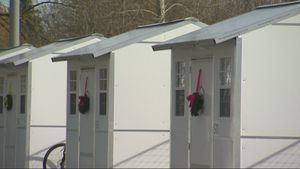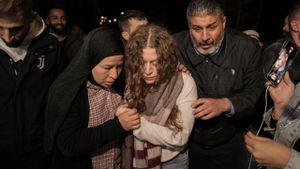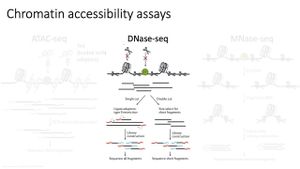On February 1, 2025, Hamas militants successfully executed another round of hostage releases as part of the ceasefire agreement with Israel, bringing the total number of Israeli hostages freed to eighteen since the truce began on January 19. The latest exchange involved three male hostages—Keith Siegel, Yarden Bibas, and Ofer Kalderon—returning home to emotional reunions with their families, illuminating the tense, fragile situation surrounding the negotiations.
Hamas's coordinated transfer of the three hostages, which took place on February 1, was marked by increased organization compared to previous exchanges. Reports indicated the hostages were handed over peacefully during ceremonies facilitated by the Red Cross, contrasting with the chaotic scenes witnessed earlier. This time, groups of masked Hamas fighters stood on stage, presenting the hostages to supporters against the backdrop of flags and cheering crowds.
Israeli Prime Minister Benjamin Netanyahu's office confirmed the release of 183 Palestinian prisoners simultaneously on the same day, highlighting the stark realities of the negotiations at hand following 15 months of conflict. These exchanges are part of the broader ceasefire framework, which stipulates the release of up to 33 hostages from Israel for nearly 2,000 Palestinian prisoners. Netanyahu is scheduled to meet with U.S. President Trump on February 3 to discuss the next steps for the truce, following promises of support from the U.S. and other mediators such as Qatar and Egypt.
This exchange brought both relief and concern, with the families of the released expressing joy at their return but simultaneously mourning for those who remain captive. Yarden Bibas, whose two young children were also abducted during the initial waves of conflict, faced the bittersweet reality of his release as he continues to grapple with the fate of his wife and kids. Bibas's family described their emotional reunion, noting how he was deeply affected by the conditions of captivity. “A quarter of our heart has returned to us,” Bibas’s family stated, encapsulating the complex emotions surrounding hostage situations.
American-Israeli Keith Siegel, who had been held for fifteen months, also shared poignant remarks following his release. He thanked those who worked for his freedom, reflecting on the harrowing conditions he endured. His daughter, present during his return, provided her support, creating heartwarming moments broadcasted to viewers across Israel and abroad.
Meanwhile, the Palestinian prisoners released include individuals associated with various factions, including some arrested after the initial October 7, 2023 assault by Hamas on Israel. The releases were seen as both celebratory and somber, as many of the freed Palestinians emerged from their captivity frail and visibly affected by their experiences. Palestinian officials stated these prisoners had been subjected to harsh treatment, echoing concerns raised by advocacy groups about conditions within Israeli prisons.
The ceasefire's initial six-week phase opened the door for increased humanitarian aid to flow back to Gaza, alleviating some of the suffering endured by civilians. For the first time since Israel's military incursions nine months prior, the Rafah crossing with Egypt reopened, allowing sick and wounded Palestinian children to receive treatment—a positive development amid the chaos.
The dynamics between Hamas and Israel remain complex, particularly as they prepare for negotiations over the second phase of the ceasefire. Netanyahu’s administration faces both domestic pressures and international expectations to secure the release of remaining hostages. Israeli officials have expressed grave concerns for eight hostages rumored to have died but have not confirmed these reports, complicate the negotiations.
Families of the still-captive hostages organized public rallies, passionately urging action from the government to secure their loved ones’ return. “We will not allow you to blow up this deal. We will not allow you to force us back anything more destructive,” said Naama Weinberg, cousin of deceased hostage Itay Svirsky, lending urgency to the families’ plight and calls for action.
The hostage exchanges have illuminated the humanitarian crises experienced by both communities, with overwhelming casualties reported. Over the course of the war, Palestinian authorities claim more than 47,000 casualties have occurred, predominantly comprising women and children, raising concerns internationally about the conduct of the conflict and the behaviors of both sides.
The complex interweaving of family reunifications, political negotiations, and humanitarian issues surrounding these exchanges leaves many hopeful yet apprehensive. Hostage situations create emotional binds between loved ones and political landscapes, intertwining personal grief with broader societal implications. With future negotiations looming, the world watches closely, hoping for resolution and peace amid the turmoil.



